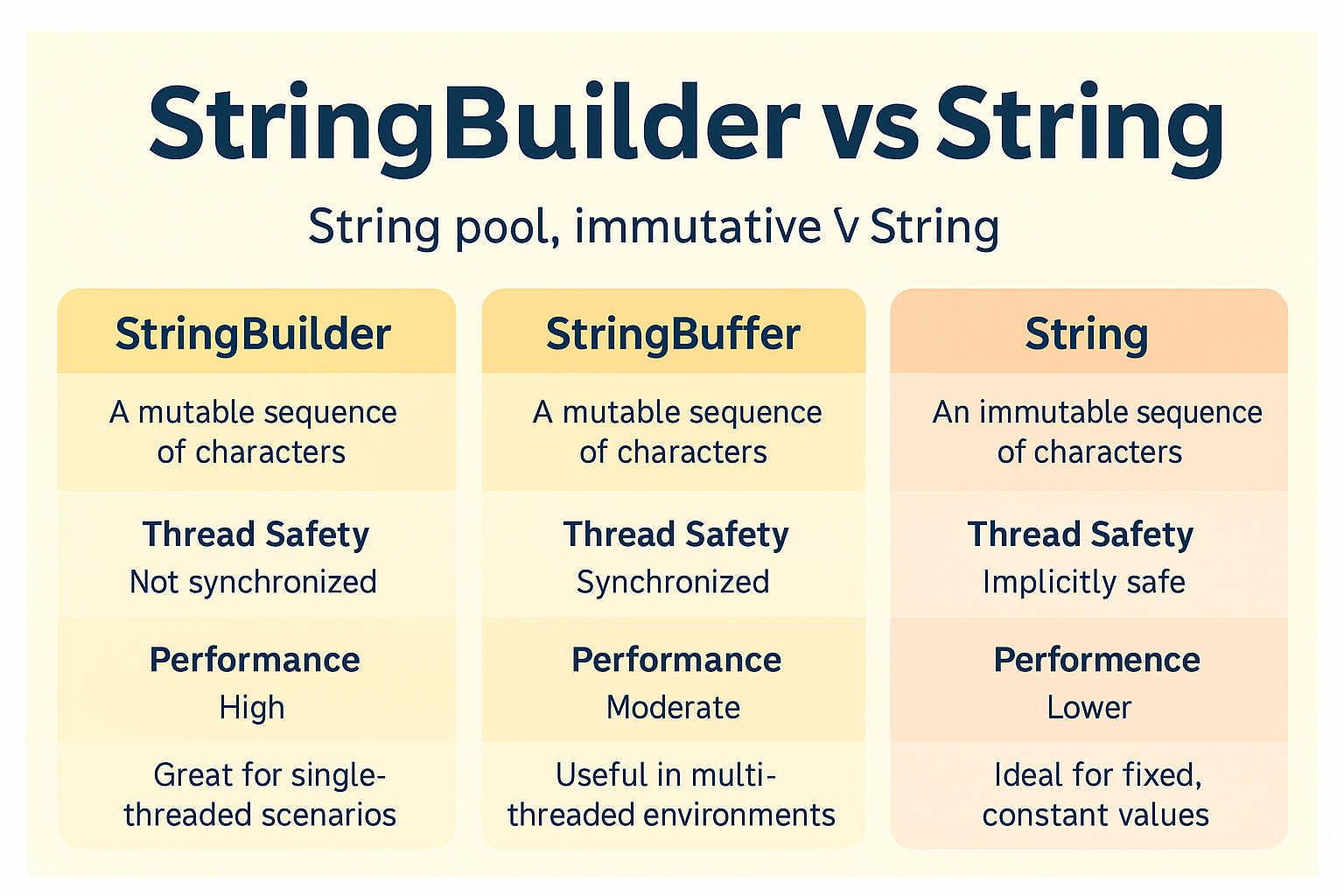Introduction
In Java, strings are a core part of almost every application. Developers often debate whether to use String, StringBuilder, or StringBuffer. Understanding the differences is crucial for writing efficient and thread-safe code.
Why does it matter?
Choosing the wrong type can lead to performance bottlenecks or unexpected behavior in concurrent environments. This tutorial explains each type in detail with use-cases, performance benchmarks, and best practices.
String – Immutable Text Handling
- Immutable: Once created, the value of a
Stringobject cannot be changed. - Stored in the String Pool, reducing memory usage for identical literals.
String name = "Java";
name.concat(" Programming"); // Doesn't change original
System.out.println(name); // Output: Java
Use-Cases:
- Constants and configuration values.
- Keys in collections.
- When thread safety and immutability are required.
Common Mistake:
Using String for heavy concatenations inside loops causes excessive object creation.
StringBuilder – Mutable and Fast
- Mutable: Can modify content without creating new objects.
- Not thread-safe, but faster than
StringBuffer.
StringBuilder sb = new StringBuilder("Java");
sb.append(" Programming");
System.out.println(sb); // Output: Java Programming
Use-Cases:
- Efficient concatenation in single-threaded apps.
- Building dynamic strings, like SQL queries or reports.
Performance:
StringBuilder outperforms String and StringBuffer for heavy modifications due to fewer object allocations.
StringBuffer – Mutable and Thread-Safe
- Similar to
StringBuilderbut synchronized, making it thread-safe.
StringBuffer sbf = new StringBuffer("Java");
sbf.append(" Programming");
System.out.println(sbf); // Output: Java Programming
Use-Cases:
- Multi-threaded environments where multiple threads modify the same string.
- Legacy systems that rely on synchronized operations.
Performance:
Slightly slower due to synchronization overhead.
Comparison Table
| Feature | String | StringBuilder | StringBuffer |
|---|---|---|---|
| Mutability | Immutable | Mutable | Mutable |
| Thread-Safety | Yes (Immutable) | No | Yes (Synchronized) |
| Performance | Slow in loops | Fastest | Slightly slower |
| Use-Cases | Constants, keys | Dynamic strings | Multi-threaded apps |
Best Practices
- Use
Stringfor constants and values that won’t change. - Prefer
StringBuilderfor heavy concatenations in single-threaded apps. - Use
StringBufferonly when multiple threads modify the same string.
Real-World Analogy
Think of:
- String as a permanent ink note – once written, it can't be changed.
- StringBuilder as a whiteboard – easy to erase and rewrite but not safe if everyone uses it simultaneously.
- StringBuffer as a whiteboard with a lock – safe in teams, but slower due to waiting turns.
Interview Questions
- Why is String immutable in Java?
- Security, String pool optimization, and thread safety.
- When would you use StringBuffer over StringBuilder?
- In multi-threaded environments.
- Can StringBuilder be made thread-safe?
- Yes, by manual synchronization or using
Collections.synchronized...wrappers.
- Yes, by manual synchronization or using
Conclusion
Choosing the right string class impacts both performance and safety. For most modern apps, use String for fixed values, StringBuilder for mutable strings, and StringBuffer only in concurrent scenarios.
